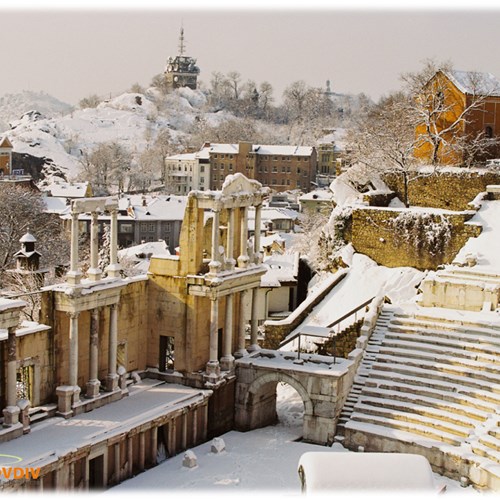
Plovdiv, Bulgaria
The city of Plovdiv is the second largest city in Bulgaria and one of the best-preferred travel destinations, not only because of its huge cultural and archaeological heritage, but also due to its central location, offering a variety of tourist attractions and activities.
Due to the diverse opprotunities for tourism, the city has been listed in a number of prestigious ranks, among which European Best Destinations 2016.
In 2019 Plovdiv will be European Capital of Culture.
Population:
505 310 (2017)
Currency:
Lev (BGN)
Emergency Numbers:
Police, Ambulance, and Fire Brigade: 112
Opening Hours:
Newspapers:
The Ancient City

Life in Plovdiv has never ceased since its first inhabitants - Thracian tribes, settled down about 8, 000 years ago. Due to this fact it has been proclaimed by Daily Telegraph 'The Oldest Continuously – Inhabited City in Europe'.
In IV century BC Philip II of Macedon conquered the city and gave it one of its most popular names – Philippopol. Philippopol played an important role in formation of Hellenistic culture.
In 46 AD Thrace became a Roman province and Plovdiv was given the name Trimontium (City on Three Hills), but citizens often referred to it with its previous name - Philippopol. Later it was proclaimed a metropolitan city of the Thracian province. After the separation of the Roman Empire, it became part of the Byzantine Empire, until it was first conquered by Bulgarians under Khan Krum in 812.
During the Ancient period, Philippopol became a city as significant as it is nowadays. In the ast 8 millenia, representatives of various civilizations left their imprint and created unique of its kind cultural heritage. Doublessly, the cultural sites from the Roman period are among the most well-preserved in the modern city.
As a metropolitan city of the Roman province of Thrace, Phlippopol was gradually equipped with all the commodities, typical for a leading administrative center: a Forum and Odeon, magnificent theatre - venue of cultural life not only in Antiquity, but also in the modern city, a huge stadium, which hosted games, resembling the Olympic games, as well as Aquaducts. Soon after Christianity was legalized in the beginning of VI century, the city became an important religious center.
Plovdiv - European Capital of Culture 2019

Plovdiv is the first Bulgarian city chosen to be European Capital of Culture. In 2019, twenty years after the city was a host of the Month of Culture in 1999, it will celebrate the most prestigious cultural initiative of the European Union.
European Capital of Culture is a unique project for Bulgaria which provides new opportunities for the development of the potential of the city and new international visibility and a perspective on Bulgarian culture as a whole. The programme of Plovdiv European Capital of Culture 2019 also includes activities and events in the South Central Region of Bulgaria.
After four years of preparation, the programme is already a fact, with more than 300 projects and nearly 500 events covering not only the city but also the whole South Central Region as well as the cities finalists from the second round of the competition – Varna, Sofia and Veliko Tarnovo. Within the framework of the initiative, many traditional city events have gained new strength and have expanded, new festivals have emerged, and an extraordinary amount of new experience with cultural content and its management, will surely remain as a
legacy of the initiative.
The beautiful Italian city of Matera, together with Plovdiv, has been chosen as the twin European Capital of Culture for 2019.
The two cities are collaborating actively and have common projects and initiatives. For 2019 Matera also represents the region of Basilicata.
The Old Town

Ancient Plovdiv Architectural and Historical Reserve (The Old Town) has preserved enormous cultural heritage formed during 8 archaeologic periods – Prehistoric, Thracian, Hellenic, Roman, Late-ancient, Medieval, National Revival, and Post-Liberation periods as well as modern culture.
Apart from the Roman sites, The Old Town fascinates with beautifully-ornamented Revival houses, most of which have been turned into museums and galleries. These buildings are characterized by unique national interpretation of the European baroque.
Museums and Galleries

The abundance of art galleries and museums makes Plovdiv a must-visit city, famous as the city of artists.
There are over 300, 000 immovable artefacts in the city's museums from all of the 8 archaeological periods of its history.
Temporary expositions also take place to display private collections, or expositions of paintings by young artists.

